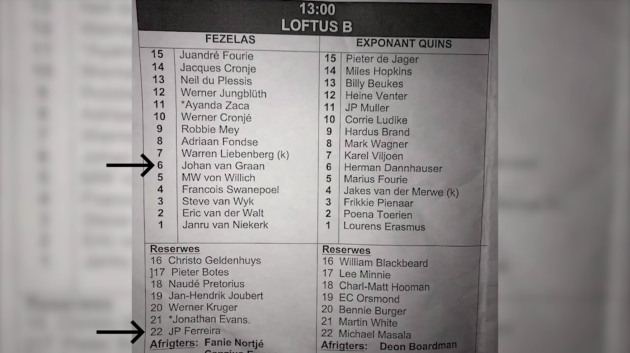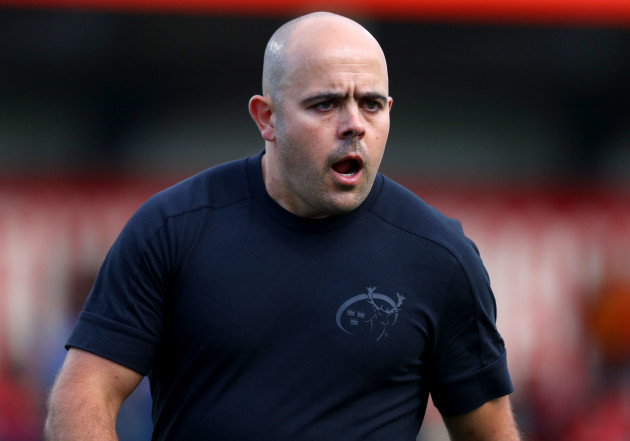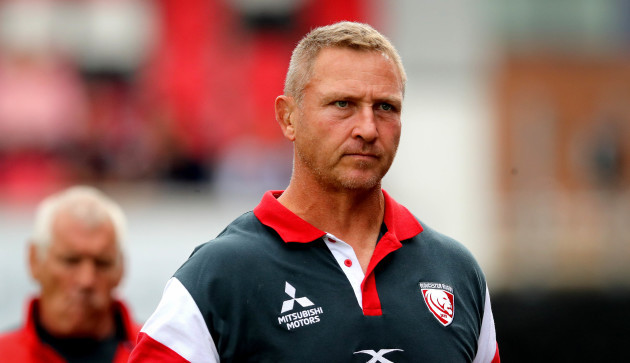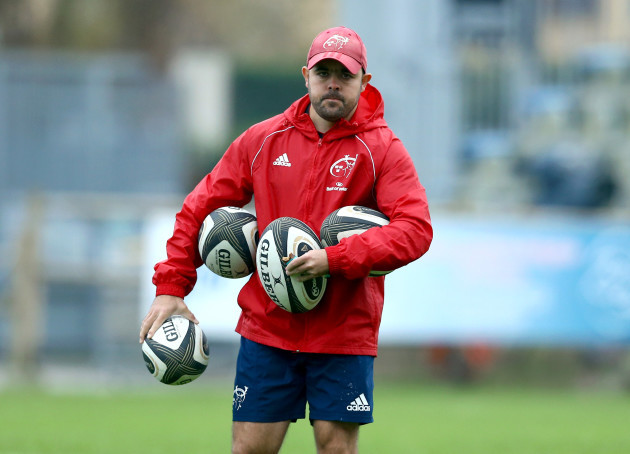JOHANN VAN GRAAN and JP Ferreira first met as players in their native South Africa, although Ferreira – who is now Munster’s defence coach – had no memory of it until someone sent him a photo of an old match programme just before he moved to Ireland.
Ferreira and van Graan, it transpired, had been in the same matchday squad for the University of Pretoria in the early 2000s.
By the time Munster head coach van Graan had convinced Ferreira to relocate his young family to Limerick in December 2017, the pair were more than familiar with each other.
They first built a relationship during their time as analysts, van Graan working for the Blue Bulls and Ferreira for the Lions, then furthered the friendship as coaches when they were part of the Springboks’ staff on the 2016 November tour.
Van Graan is still only 39, while Ferreira is four years his junior – these are relatively young men in the world of rugby coaching but their upward trajectory is one that is increasingly common in the sport: analyst to coach.
Van Graan and Ferreira didn’t have high-profile playing careers but both men share a lifelong obsession with rugby that has catapulted them towards their work with one of the most famous teams in the game.
Ferreira, coming towards the end of his first full season with the province, has overseen a superb defensive campaign from Munster – who have conceded the fewest number of tries in both the Guinness Pro14 and Heineken Champions Cup.
While Munster’s attack has struggled at times, Ferreira’s defence has been consistently excellent. As importantly, his wife and two young daughters are happy in Limerick and he feels part of the Munster family.
“The first six months was always going to be challenging, especially coming in mid-season and trying to get to know everyone, suss it all out,” says the Pretoria man.
“But the people have been unbelievable in getting us set up as a family. The players have really made us feel part of Munster, which is massive.”
Ferreira has been a rugby fanatic from as early as he can remember, first playing at the age of seven.
His father played club rugby but his athletic genes came from his mother, former international tennis player Brigitte Cuypers, who was a South African champion multiple times, as well as playing in Wimbledon, the US Open and the French Open.
Growing up, Ferreira played at fullback or on the wing and recalls “always saying I’d rather kick a ball than study.” His future as an analyst was also hinted at in his youth.
“I’ve still got tapes of the 1995 World Cup in a box I have in storage,” says Ferreira.
“I used to come back from school, I was 12 at the time that World Cup was on the go, and I would put in tapes every single day and I’d watch them so many times that I was sitting there commentating myself as the commentators were also commentating.”
Ferreira didn’t play in the famous Craven Week schoolboy competition – where many future pros first make their names – but some connections of his father’s managed to secure him a trial with Bridgend in Wales after he left school.
“I went over to Wales the day after I finished my last school exam and little did I know but in the changing room were Dafydd James, Nathan Budgett, Gareth Thomas, and some Tongan guys like Maama Molitika and Josh Taumalolo,” says Ferreria.
“I was taken aback by the size of them. I was only 18.”
Ferreira impressed enough to secure a contract and spent seven months training with the senior team and playing with Bridgend’s U21s before returning home to South Africa.
The Blue Bulls’ Ian Schwartz, who went on to be Springboks team manager, then invited the youngster into the franchise for a trial, after which Ferreira played for the Bulls at U19 and U20 level, as well as training with the Springboks 7s squad.
But only Morné Steyn, Pierre Spies and Wynand Olivier of his U20 vintage advanced onto senior terms with the Bulls, with Ferreira moving to a smaller South African union called the Leopards and then onto the Falcons of the Gauteng province, who play in the Currie Cup.
Ferreira suffered a knee injury in 2005 and it looked like he would be released by the Falcons until he was struck by an idea.
“I told them, ‘If you’re not going to offer me a contract just to play, I’ll do the analysis for you.’ The analysis guy had just decided to leave. I knew I could get back to play, so they kept me on, I did the analysis and it took off from there.”
Ferreira played on until 2007 – his final game was a Currie Cup defeat to the Sharks – before his growing reputation as a rugby brain drew an offer from the Lions in Super Rugby to work solely as an analyst.
Ferreira learned from many coaches at the Lions – Eugene Eloff, Jake White, Dick Muir and John Mitchell – as his role gradually morphed from analysis into coaching. When Johan Ackermann took on the head coach role in 2012, the transition became permanent as he was made defence coach of the Lions.
“It was just the two of us as coaches,” says Ferreira. “After that, Johan just said, ‘I don’t want you behind a desk anymore. You’ve got to be on the pitch, I want you to coach.’
“It really sparked it in 2012. You’ve got to take that knowledge you have from being an analyst into being a coach.
“I’m not a guy that boasts but because I watched so much rugby and was so fanatical about rugby, that led to other things. With the analysis, it was going into depth about other teams, looking at trends in attack. Although you’re an analyst, I was allowed to speak up and suggest things, finding things that might improve the team.”
Ferreira was also head analyst for the Lions up until leaving for Munster, but his role as defence coach was the priority. He helped the Lions to their 2015 Currie Cup success, as well as back-to-back Super Rugby finals in 2016 and 2017 when they had the best defence in the competition.
“I had a strong idea what I wanted to do,” says Ferreira of being handed the defensive reins. “At the time, I would like to think what we did with the Lions wasn’t really in Super Rugby.
“Very basically, it was to get the quicker guys on the outside and the slow guys to the inside and how you do that. It was different back then, everything with defence has changed since.”
Defence has certainly transformed drastically in Ferreira’s time in the game, from a place where linespeed was nothing like the common theme it is now to the current status quo of having 13 or 14 players in the frontline racing towards the attack at speed.
And shifting to Munster has been another welcome change for a defence coach coming from the Southern Hemisphere.
“Defence in Europe is much more on the top shelf than what it is in Super Rugby,” explains Ferriera. “You’re sort of on the back burners in Super Rugby, where it’s more attack focused and the defence is just carrying the team but it’s lower down the order.”
Coming in mid-season in December 2017 alongside van Graan was challenging for Ferreira, although he says previous defence coach Jacques Nienaber – now part of the Boks set-up with Rassie Erasmus – had left the place in good order.
“I didn’t come in here and say, ‘Ok, we’re scrapping everything and going with my way.’
“I don’t believe in that, I believe that there was a system in place and it did work, but can there be improvements? Definitely, so I then implemented small things to improve it.”
Ferreira focused on ensuring Munster’s players were better at staying ‘connected’ in defence. Even when bringing linespeed, Munster’s players have been good at working with the team-mates either side of them.
“That was one area I asked questions of; ‘How come we are going into semi-finals and don’t go into finals?’ I looked at videos where we were trying to make crazy reads on the outside and taking ourselves out and teams were ripping us apart.
“When you get into knock-out rugby, you’ve got to stay alive. If you’re going to take yourself out by trying to make a read, how are you going to get those trophies? So for me, it was trying to get that mindset of staying connected and staying alive.”
Ferreira says he loves “getting my hands dirty” with the technical aspects of coaching defence, while his analysis background means he’s a big believer in the value of going through match footage in detail.
Like most defence coaches, he stresses that mindset and communication are as important as anything, saying that “even if we had the shittest plan, it might actually be the best plan – there might be five different options of defending something but if we all agree on one, that can be the right thing.”
In Ferreira’s eyes, defence can be straightforward if the attitude is right.
“I said it to the lads at the beginning of the season, ‘If you’re not going to be a person that puts your body on the line, then you can’t play for this side.’ That’s how it should be.
“Before I took this job in Munster, I really looked at the emblem. The one thing that stood out was the stag on the emblem.
“The meaning behind that is that the stag stands its ground.
“That, to me, is what we are about.
“We stand our ground every single Saturday.”
Gavan Casey and Murray Kinsella are joined by Andy Dunne to discuss all the week’s rugby news.:
The42 Rugby Weekly / SoundCloud
Subscribe to our new podcast, The42 Rugby Weekly, here:




